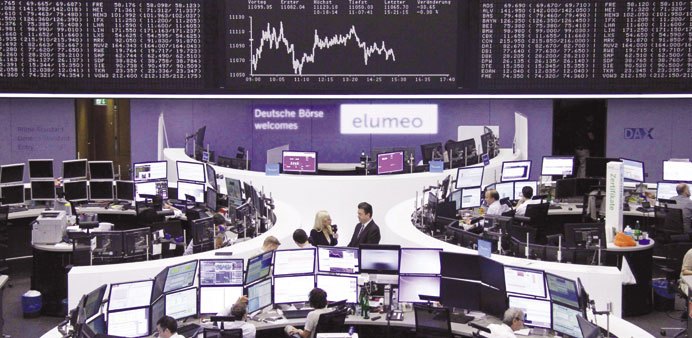Traders work in front of the DAX board at the Frankfurt Stock Exchange. The DAX 30 declined 0.37% to 11,058.39 points yesterday.
AFP/London
Europe’s main stock markets slipped yesterday with all eyes on Greece’s weekend referendum on its bailout terms and future place in the eurozone.
In the eurozone, the CAC 40 in Paris closed down 0.57% to 4,808.22 points and Frankfurt’s DAX 30 declined 0.37% to 11,058.39 points amid the uncertainty over the outcome of the Greek referendum which the latest opinion polls say is too close to call.
Outside the eurozone, London’s benchmark FTSE 100 index of top companies fell 0.67% to end the day at 6,585.78 points.
“All eyes are on the Greek referendum on Sunday,” said VTB Capital economist Neil MacKinnon, with US markets shut yesterday ahead of the July 4 Independence Day celebrations.
“The vote seems tight. A ‘No’ vote increases the chances of a Grexit as the ECB would pull the plug on the Greek banks,” he said.
“A ‘Yes’ vote results in the resignation of the Greek government though it is not clear that this would necessarily result in a more creditor-compliant Greek administration that would sign up to the creditors’ proposals quickly.”
The Greek bank association said yesterday the banks have “sufficient liquidity” until they are scheduled to reopen Tuesday, when capital controls imposed by the government following a breakdown in talks with its international creditors are due to be lifted.
But if the ‘No’ vote wins, “much would depend on the reaction of the ECB and whether it was willing to continue to sanction Emergency Liquidity Assistance (ELA) to Greek banks,” without which “capital controls in the country would probably have to remain in place or even be stepped up,” said analyst John Higgins of Capital Economics.
The euro dropped below $1.10 earlier before recovering slighting to $1.1098 from $1.1086 late in New York on Thursday.
“With the vote so close to call, we should of course expect a big euro/dollar move on Monday,” said Derek Halpenny, European head of markets research at Bank of Tokyo-Mitsubishi.
“However, a ‘Yes’ victory that lifts the euro may not last long,” he added.
Connor Campbell, analyst at Spreadex trading group, said that even if the IMF implicitly blamed Tsipras’s Syriza party for the economic deterioration in Greece since it came into power, the Washington-based institution stated that the country needs an extra 60bn-euros relief programme alongside debt relief in any new deal and a 20 year grace period for any repayments.
Awaiting the outcome of Sunday’s crucial vote, European markets appeared to largely watch and wait yesterday.
“So close to a potential Grexit decision, we can sniff no whiff of panic across Europe,” said Holger Schmieding, chief economist at Berenberg Bank.

